Valentyn Siniy leads a theological institute in Ukraine destroyed by the war. He recounts how they reorganised to continue training pastors and shares personal experiences from these 3 difficult years.
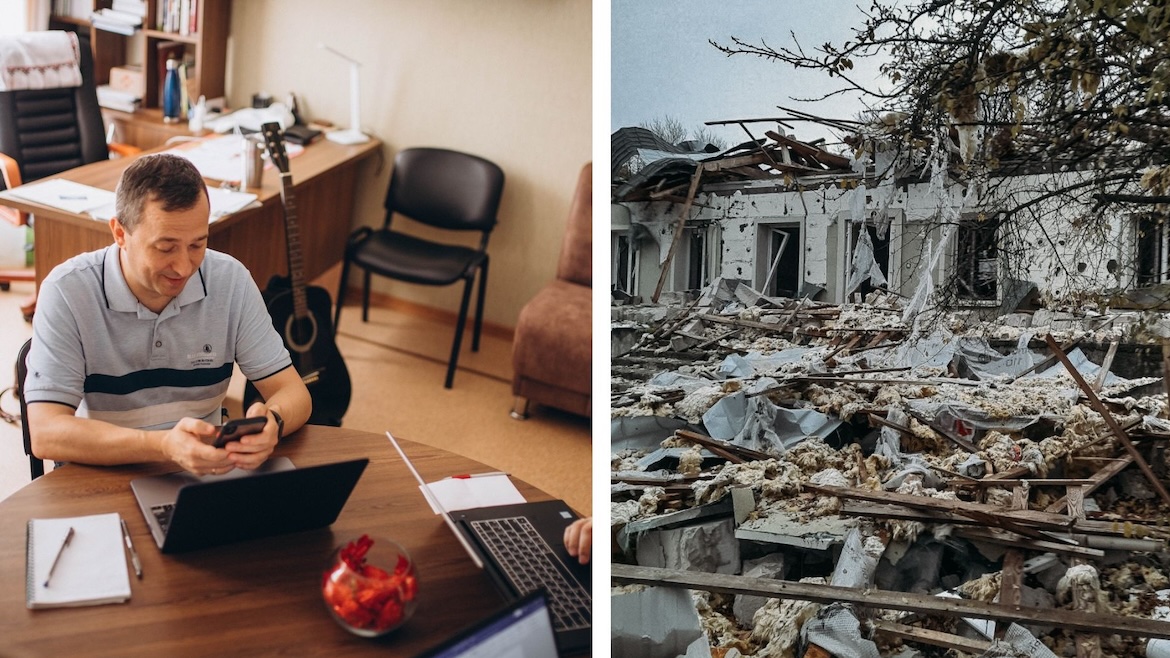 Left: Valentyn Siniy, in the seminary office before the invasion. Right: the offices after the Russian invasion./ Courtesy of the owner.
Left: Valentyn Siniy, in the seminary office before the invasion. Right: the offices after the Russian invasion./ Courtesy of the owner.
When Russia began its invasion of Ukraine in February 2022, the Tavriski Christian Institute (TCI) in Kherson was caught up in the military advance.
Teachers, students and families had to flee in haste, scattering to different regions of Ukraine and abroad as the area fell under occupation.
Two years later, the institution continues its work from western Ukraine. Despite facing difficulties of all kinds, its president, Valentyn Siniy, and his team continue to train people for ministry in a context of war.
Siniy has recently published a book reflecting on his experiences, whose original Ukrainian title could be translated as The Man Whose Home Was Stolen. The English version is titled Serving God under siege: How war transformed a Ukrainian community. The author explores the soul-wrenching experience of losing almost everything. However, it is also a story of hope.
All Evangelical Focus news and opinion, on your WhatsApp.
“This book is the confession of an adult man, a kind of prayer at the altar. And since confessions are often sad, I discussed with the illustrator the idea of black and white images. However, in order to convey hope, I asked that each illustration contain a colourful element, symbolising a ray of light and faith in the best”, he explains in the prologue.
Siniy attended the recent Lausanne Europe meeting in Valencia, alongside two other Ukrainians.
It was a special moment to hear their stories and learn more about the ongoing Russian military attacks that the country continues to suffer every day. He asked Europeans not to stop praying and to “not forget Ukraine”.
After the meeting, Spanish news website, Protestante Digital, interviewed him about the situation in Ukraine, the Tavriski Christian Institute and his book.
Question. Tell us something about your personal story. How did you come to lead the Tavriski Christian Institute, and what was its mission before the war?
Answer. It was really a miracle. TCI was founded in 1997, after the collapse of the Soviet Union and the end of the communist regime, when many churches began to grow in Ukraine and the region needed trained leaders and pastors.
Local pastors, along with some American partners, decided to start the TCI, focused on preparing pastors, mainly in the south of the country, between Crimea and Odessa.
I was the associate pastor of a church in Kherson. The first president of the seminary was Sergey Predid. In 2006, his oldest son was diagnosed with autism, and he had to move to Romania for treatment.
The board asked me to lead the TCI “for a short time”. Now, almost 20 years have passed, and I’m still still here. I deeply believe in pastoral training, that is why I am still here.
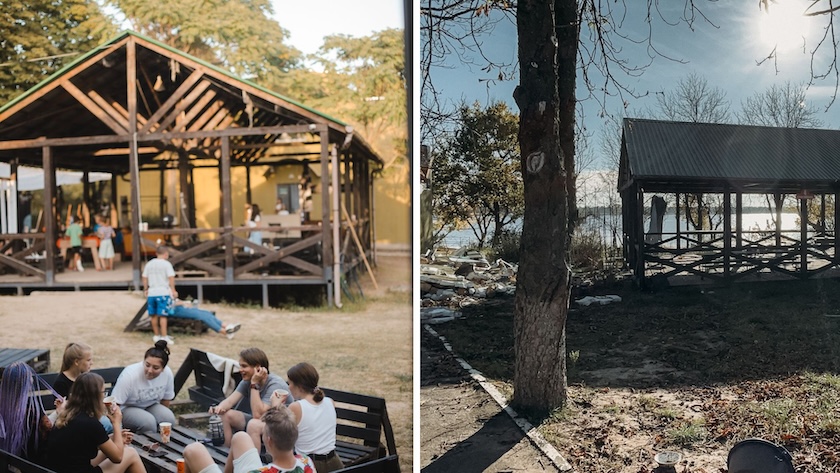
[photo_footer] The TCI was a reference in leadership training, and also offered programmes and spaces for young people and children. On the left, the state of the facilities after the attacks. / Courtesy of the owner. [/photo_footer]
Q. How was the institute just before the invasion in 2022?
A. We had a large, five-hectares campus near the Dnipro river, with five buildings and several self-supporting businesses: a greenhouse, a recreation center, a small publishing house, and a sports equipment business.
TCI had around 300 students in Ukraine and abroad. It was also the first evangelical school in the country to receive a government license.
Two weeks after the invasion, Russian soldiers occupied Kherson and our campus. We only managed to save the students’ documents.
Then, in August 2022, three of our buildings were destroyed. Later, another one was hit, and recently the last building was destroyed. Our library was lost after the Kakhovka dam explosion.
Today we are in Kyiv, after relocating first to Ivano-Frankivsk, in western Ukraine, where we stayed for about two and a half years.
At first, we focused on humanitarian aid and evacuation. Over time, we saw another urgent challenge: many pastors fled or were called up for military service, so that we created one-year and two-year training programs for new pastors.
Q. On a personal level, one of your relatives is on the front line...
A. Yes. My son-in-law is a combat medic on the front line. It is very hard for our family. Every day is a challenge. As Christians, we want peace, but sometimes, defending your country and protecting others becomes necessary. We pray every day for our soldiers.
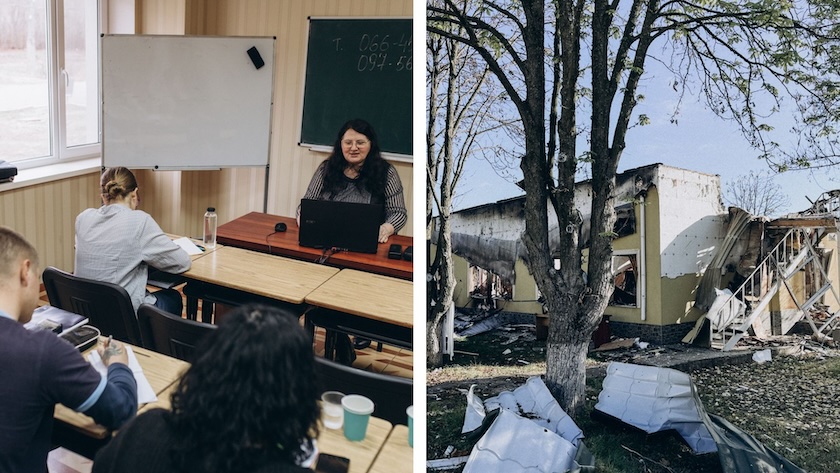
[photo_footer] In the book, Siniy recounts how they had to flee quickly when the Russian attack began, Kherson was one of the first cities to be invaded. / Courtesy of the owner. [/photo_footer]
Q. How has your perception of God and faith changed during this time?
A. It has been a very painful process. At first, many Ukrainians felt spiritually disoriented. It seemed that God was far away. But He spoke to us in new ways, especially through prayer and Scripture.
I remember one experience that marked me deeply. We took a young refugee woman to the Polish border, and I thought: “We will probably never see her again”. It was a rainy day, and I was asking God many questions.
Later, that young woman told us that at the border, an American volunteer gave her a cup of hot tea and said, “I came all the way from the U.S. to help you”. It was God's way of showing us that He was with us through others.
We have seen that through the love and help of Christians from the U.S., Spain, Poland, and many other countries. Those are the hands of God.
Q. In your book, you write about the war transforming the community. What does that mean?
A. In Ukrainian, the book has a different title: The Man Whose Home Was Stolen. It’s not just about buildings. In our culture home means extended family, church, city, roots.
I was born, studied, ordained and raised my children in Kherson. I have been in the church since 1995. You know everyone, from the baker to your neighbour.
War does not just destroy homes. It breaks communities, habits, shared memories. It scatters us. But it also transforms faith, solidarity, identity. That is why the book is more about the soul than about walls.
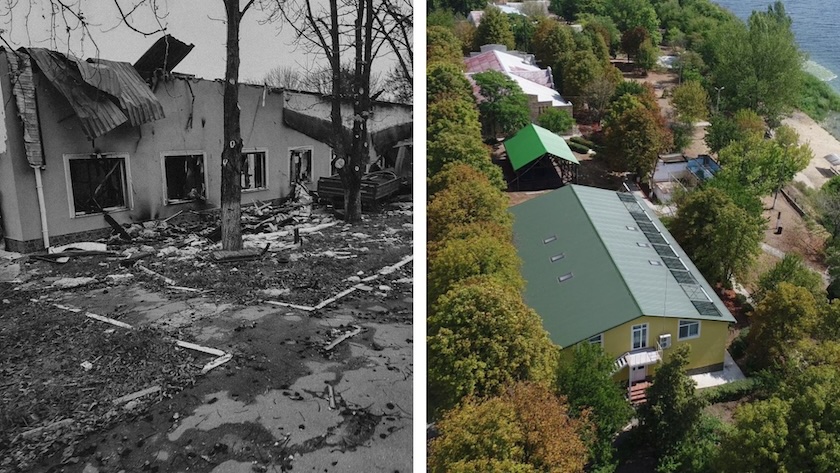
[photo_footer] War leaves destruction and wounds, but Siniy believes that there is always hope. In the photos, the facilities of the Tavriski Christian Institute, before and after August 2022. / Courtesy of the owner. [/photo_footer]
Q. How can the European church help?
A. First of all, I would like to ask you to pray for us constantly. Prayer changes the future. At first, I thought God had forgotten us, until I recovered my prayer life.
Also, do not get tired of helping. I know Europe is tired of hearing about Ukraine, but the need continues.
I recently spoke to a pastor in Kherson who had been trying for months to raise £150 for fire extinguishers in his church, and still can’t raise it. Meanwhile, large organisations receive huge amounts of funding. Sometimes a small gesture saves a life.
If you have the opportunity to change one life, go ahead and do it. It might be someone in Europe, in Israel, or in Ukraine.
Q. Anything else you’d like to share?
A. My grandfather fought in the Second World War. We always asked him to tell us stories, but he only remembered two acts of kindness: a German woman who gave him a glass of milk, and a British pilot who gave him a piece of chocolate when he was released from the camp. In war, it is these acts of kindness that remain.
What stories will I share with my grandchildren? I know they will be about Polish families who welcomed Ukrainian refugees into their homes, about Dutch people who sent trucks full of food, and about those who donated and prayed. Maybe some Ukrainians will forget, but we won't.
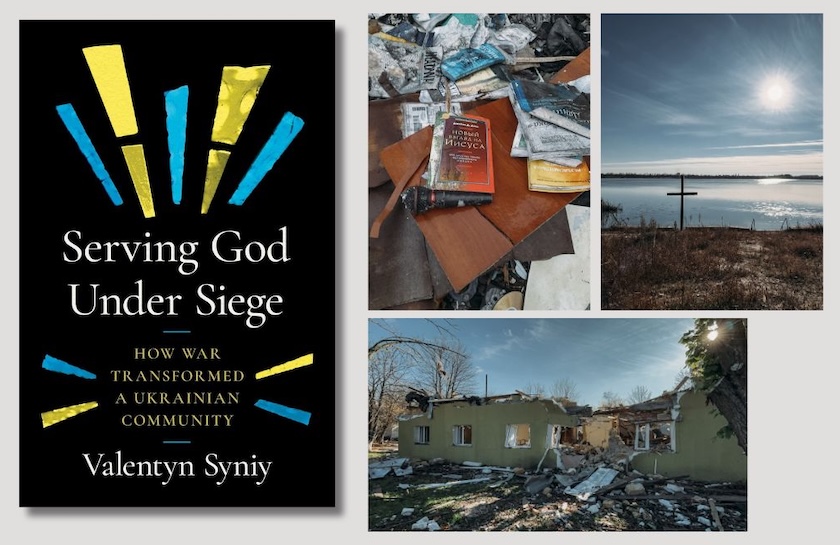
[photo_footer] The book Serving God Under Siege is available on Amazon. [/photo_footer]
[analysis]
[title]Join us to make EF sustainable[/title]
[photo][/photo]
[text]At Evangelical Focus, we have a sustainability challenge ahead. We invite you to join those across Europe and beyond who are committed with our mission. Together, we will ensure the continuity of Evangelical Focus and our Spanish partner Protestante Digital in 2025.
Learn all about our #TogetherInThisMission initiative here (English).
[/text][/analysis]

Las opiniones vertidas por nuestros colaboradores se realizan a nivel personal, pudiendo coincidir o no con la postura de la dirección de Protestante Digital.
Si quieres comentar o